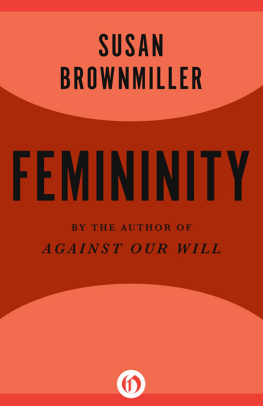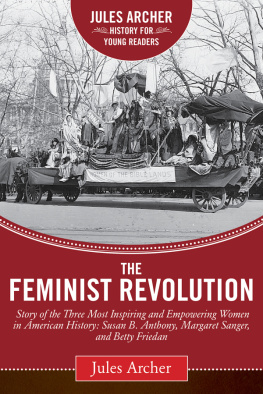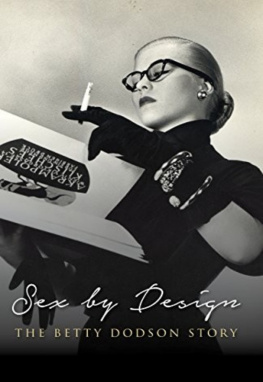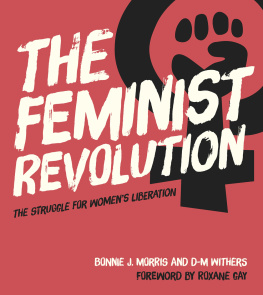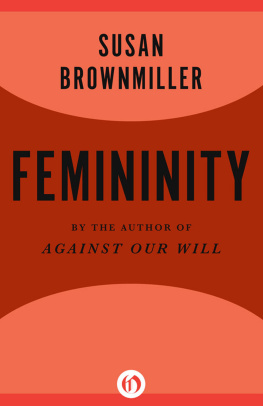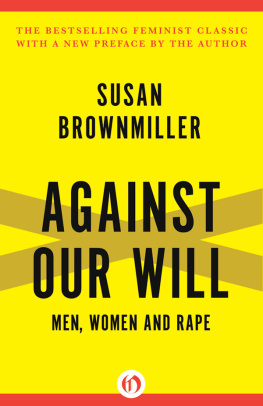IN OUR TIME
S USAN B ROWNMILLER
[A] riveting chronicle of the womens movement lively and informative.
Newsday
Fascinating theory, events, personalities, publications, media response, power struggles, and more in an orderly and chronological narrative.
The Boston Globe
Reminds us of how far weve come [A] lively, comprehensive history of feminism from the 1960s to the present. Informative and insightful.
Francine Prose, Elle
Rich in anecdotes, Brownmiller helps readers recall (or see for the first time) the sweat-equity and the fragility of womens liberation. Its a worthy reminder of the fight.
The Washington Post Book World
Rich with first-person recollection and interviews. Brownmiller evokes the excitement, the sense of newness, the alternately serious and crazy tenor of the times.
The Seattle Times
A vivid mosaic that captures the spirit of this revolution. Likely to arouse nostalgic feelings in those who remember the movement, and reveal a new world to those too young to remember back-alley abortions and commonplace sexual harassment.
Associated Press
Brownmiller shares her insider knowledge of the trenchant early years of the womens liberation movement with candor and verve. A riveting blend of eyewitness accounts and keen analysis, this is history at its most vital and a stirring testament to our ability to come together to combat social injustice, no matter how deeply entrenched it has become.
Booklist
A cogent, vivid view that conveys the drama and urgency of the womens liberation movement meetings, debates, demonstrations, church speak-outs, living-room confessionsall come passionately to life in this memoir.
Kirkus Reviews
A Delta Book
Published by Dell Publishing
A division of Random House, Inc.
1540 Broadway
New York, New York 10036
Copyright 1999 by Susan Brownmiller
All rights reserved. No part of this book may be reproduced or transmitted in any form or by any means, electronic or mechanical, including photocopying, recording, or by any information storage and retrieval system, without the written permission of the Publisher, except where permitted by law.
For information, address Dell Publishing, New York, New York.
Delta is a registered trademark of Random House, Inc., and the colophon isa trademark of Random House, Inc.
eISBN: 978-0-8041-5198-6
Reprinted by arrangement with The Dial Press
Published simultaneously in Canada
v3.1
Contents
PROLOGUE
I was not there at the beginning. Few people were. And although I can speak with confidence of a beginning, of certain documented rebellions sparked by a handful of visionaries with stubborn courage, there were antecedents to those rebellions, and antecedents to the antecedents. This is how things happen in movements for social change, in revolutions. They start small and curiously, an unexpected flutter that is not without precedence, a barely observable ripple that heralds a return to the unfinished business of prior generations. If conditions are right, if the anger of enough people has reached the boiling point, the exploding passion can ignite a societal transformation. So it was with the Womens Liberation Movement in the latter half of the twentieth century.
As I said, I arrived a bit late. On a Thursday evening in September 1968, I walked with my friend Jan Goodman to a decrepit office building on Broadway and East Eleventh Street, in Manhattan, and took the creaking elevator to Room 412, a tiny suite that belonged during the day to the Southern Conference Education Fund.
Jan had been telling me, Theyre talking about women, but I hadnt wanted to believe her, hoping that my activist days were behind me. In the four years since the two of us had gone to Mississippi to join the civil rights movement as summer volunteers, Id redirected my energy into building my career. I was thirty-three, a reporter for The Village Voice, a freelance contributor to the best glossy magazines, and a full-time network newswriter at ABC-TV, where I grappled in quiet frustration with my outsider status. I was militantly against the war in Vietnam, an unpopular stance in broadcast news, where journalists in those years seldom questioned their governments actions, but my political opinions werent the problem. I was a woman in a defiantly male preserve of clacking typewriters and cranking moviolas, and some of my colleagues had made it plain from the outset that they didnt think I belonged there. In an antediluvian age before the routine deployment of female anchors and foreign correspondents, there was an abiding feeling that women didnt have a feel for hard news and breaking stories. They couldnt be trusted to handle a stopwatch or make a cool judgment. I was stealing the bread off the table of some decent, deserving guy trying to support his wife and kids. Not all my coworkers shared these prejudiced views, but even the friendly ones liked to remind me how lucky I was to be holding a mans job.
Caroline Bird had coined a phrase for women like me that year in Born Female: The High Cost of Keeping Women Down. She called us loophole women, the few exceptions in any field that men let in to prove they werent barring everyone else. Loophole women inhabited a lonely niche and usually felt like oddballs. Even if we resisted the Freudian dictum that our career aspirations were unfeminine and unnatural, we bowed to the general assumption that the impulse to succeed at a mans job was a peculiar quirk in our individual psyches.
Imagine a worldor summon it back into memoryin which the Help Wanted columns were divided into Male for the jobs with a future, and Female for the dead-end positions; in which young, pretty, unmarried women with a taste for adventure were aggressively recruited to put on a uniform and trundle a meal cart down the aisle of an airplane (Fly Me! Im Carol!) but werent allowed to train as pilots (or bus drivers, or railway conductors, or mechanics, or firefighters); in which a male-only admissions policy or infinitesimal quotas excluded the brightest and most talented female students from the finest law, medical, engineering, architecture, and veterinary schools in the nation; and where a teaching certificate or a nursing degree was something to fall back on if, heaven forfend, you didnt get married and have children. Imagine a timeor summon it back into memorywhen a husband was required to countersign a wifes application for a credit card, a bank loan, or automobile insurance, when psychiatrists routinely located the cause of an unsatisfactory sex life in the frigid, castrating, ballbreaking female partner, when abortion was an illegal, back-alley procedure, when rape was the womans fault, when nobody dared talk about the battery that went on behind closed doors, or could file a complaint about sexual harassment. And remember the hostile humor that reinforced the times: the endless supply of mother-in-law jokes, the farmers daughter, the little old lady in tennis shoes, the bored receptionist filing her nails, the dumb blond stenographer perched on her bosss lap, the lecherous tycoon chasing his buxom secretary around the desk.
A revolution was brewing, but it took a visionary to notice. Betty Friedan had published The Feminine Mystique in 1963, defining the problem that has no name. Id read it in paperback a year later, around the time I went to Mississippi, and although Friedan had defined the problem largely in terms of bored, depressed, middle-class suburban housewives who downed too many pills and werent making use of their excellent educations, Id seen myself on every page.


